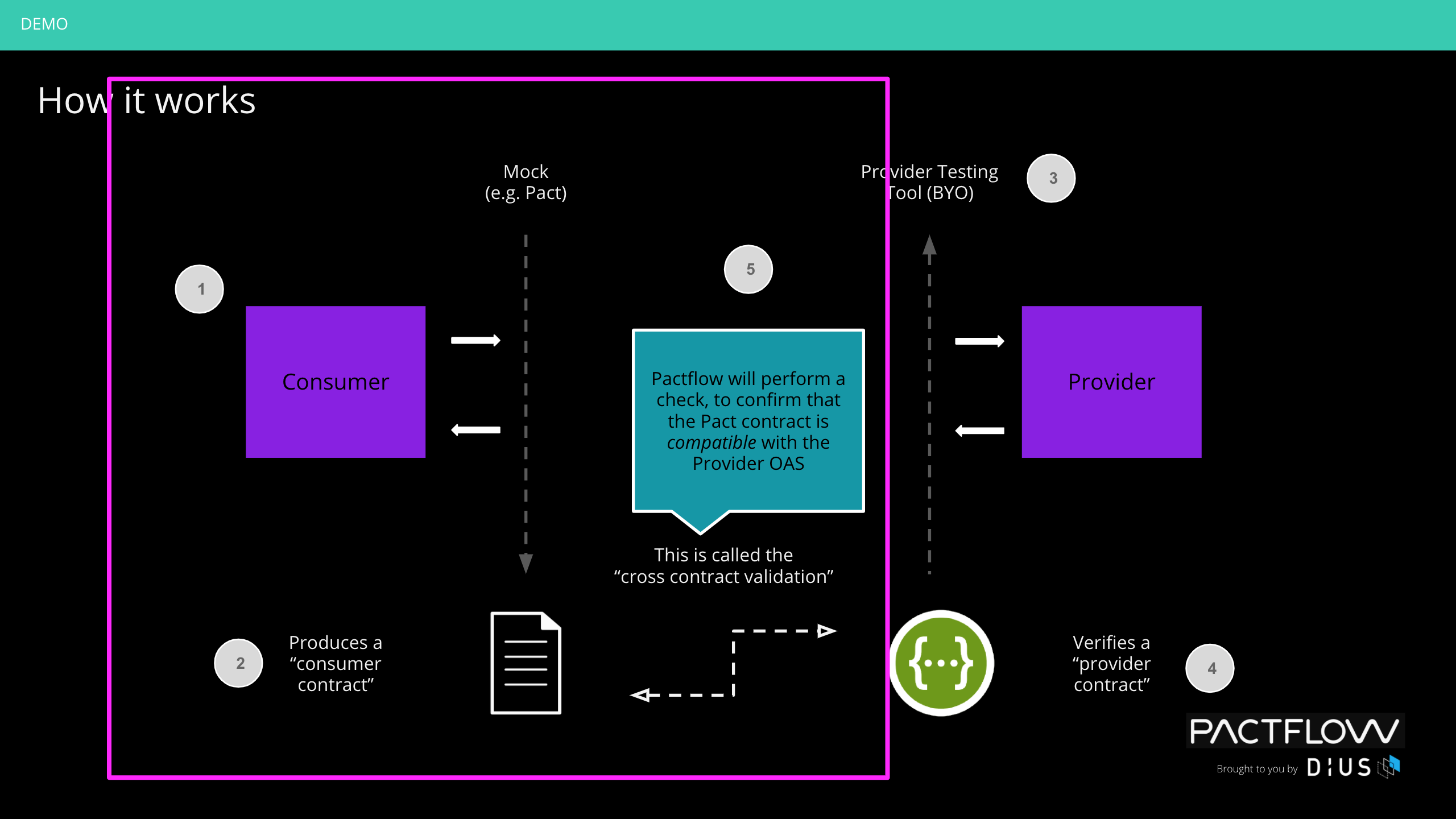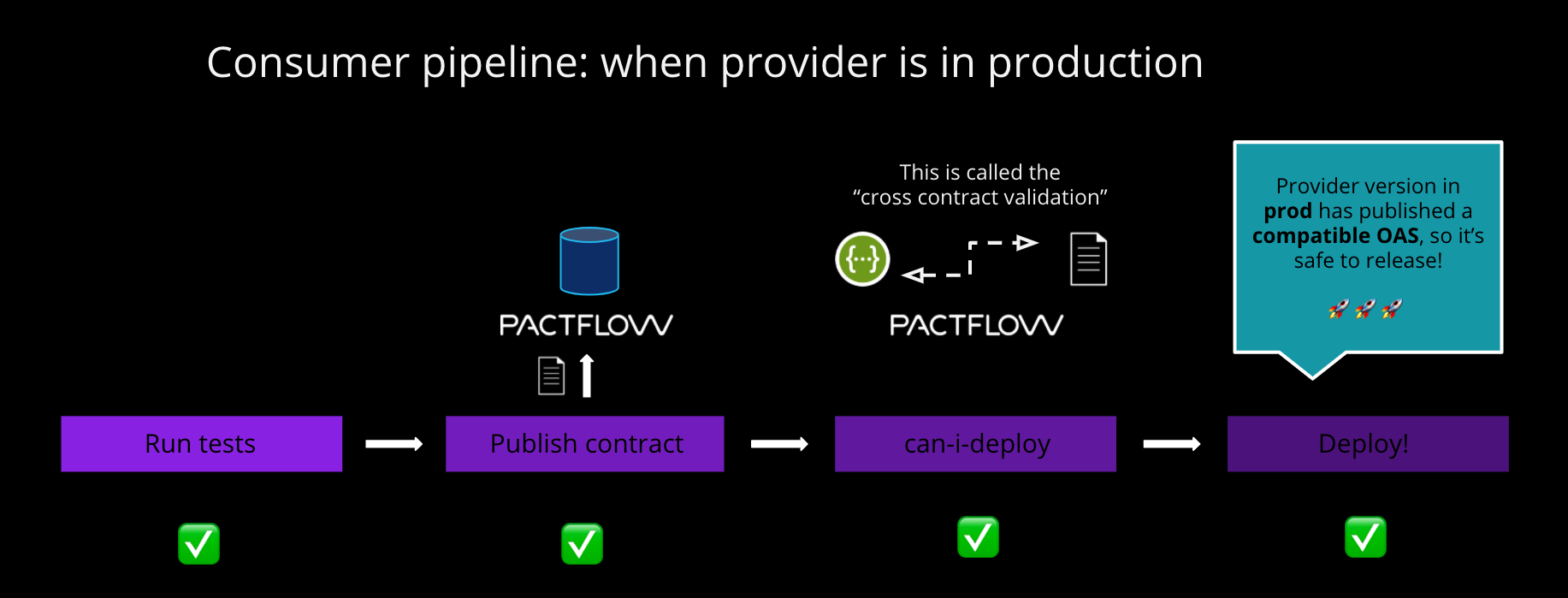Example NodeJS/React Consumer - Cypress (BYO Adapter)
Source Code
https://github.com/pactflow/example-bi-directional-consumer-cypress
- Source Code
- Overview of Example
- Overview of Part of Bi-Directional Contract Testing Flow
- Compatible with Providers
- Pre-requisites
- Usage
- OS/Platform specific considerations
- Caveats
- Related topics / posts / discussions
- Other examples of how to do this form of testing
- Found an issue?
Overview of Example
This is an example of a React "Product" API consumer that uses Cypress, pact-cypress-adapter, PactFlow and GitHub Actions to generate and publish Pact consumer contracts.
It performs pre-deployment cross-compatibility checks to ensure that it is compatible with specified providers using the Bi-Directional contract capability of PactFlow.
See the full PactFlow Bi-Directional Workshop for which this can be substituted in as the "consumer".
Key points with Cypress
It:
- It a React app implementing a "Product" website created with Create React App
- It utilises Cypress to functionally test the website
- It utilises pact-cypress-adapter to transform cypress mocks into Pact consumer contracts.
Overview of Part of Bi-Directional Contract Testing Flow
In the following diagram, You can see how the consumer testing process works - it's the same as the current Pact process.
When we call "can-i-deploy" the cross-contract validation process kicks off on PactFlow, to ensure any consumer consumes a valid subset of the OAS for the provider.

The project uses a Makefile to simulate a very simple build pipeline with two stages - test and deploy.
When you run the CI pipeline (see below for doing this), the pipeline should perform the following activities (simplified):
- Test
- Run tests (including the pact tests that generate the contract)
- Publish pacts, tagging the consumer version with the name of the current branch
- Check if we are safe to deploy to Production with
can-i-deploy(ie. has the cross-contract validation has been successfully performed)
- Deploy (only from <main|master>)
- Deploy app to Production
- Record the Production deployment in the Pact Broker

Compatible with Providers
This project is currently compatible with the following provider(s):
- pactflow-example-bi-directional-provider-dredd
- pactflow-example-bi-directional-provider-restassured
- pactflow-example-bi-directional-provider-postman
See Environment variables on how to set these up.
Pre-requisites
Software:
- Tools listed at: https://docs.pactflow.io/docs/workshops/ci-cd/set-up-ci/prerequisites/
- A pactflow.io account with an valid API token
Environment variables
To be able to run some of the commands locally, you will need to export the following environment variables into your shell:
PACT_BROKER_TOKEN: a valid API token for PactFlowPACT_BROKER_BASE_URL: a fully qualified domain name with protocol to your pact broker e.g. https://testdemo.pactflow.io
Set PACT_PROVIDER to one of the following
PACT_PROVIDER=pactflow-example-bi-directional-provider-dredd: Dredd - (https://github.com/pactflow/example-bi-directional-provider-dredd)PACT_PROVIDER=pactflow-example-bi-directional-provider-postman: Postman - (https://github.com/pactflow/example-bi-directional-provider-postman)PACT_PROVIDER=pactflow-example-bi-directional-provider-restassured: Rest Assured - (https://github.com/pactflow/example-bi-directional-provider-restassured)
Usage
Steps
NOTE: Cypress tests are located in ./cypress/integration. See below for how to start cypress test, generate consumer contract and publish contract to pactflow.
make install- install project dependencies
Run each step separately
make test_and_publish- tests the provider and publishes provider contracts to PactFlow- This will perform the following 2 calls
make testmake publish_provider_contract
- This will perform the following 2 calls
make can_i_deploy- runs can-i-deploy to check if its safe to deploy the providermake deploy- deploys the app and records deployment
or run the whole lot in one go
make ci- run the CI process, but locally (uses Docker by default)
Installing alternate pact CLI tools.
If you don't have docker, you can use one of the ruby tools. The standalone, doesn't require that you install Ruby on your host machine.
make install-pact-ruby-cli- installs the pact ruby CLI toolmake install-pact-ruby-standalone- installs the pact standalone CLI depending on your platformmake uninstall-pact-ruby-standalone- uninstalls the pact standalone CLI
Using alternate pact CLI tools.
PACT_TOOL=docker make ci- run the CI process, using the pact Docker CLI toolPACT_TOOL=ruby_standalone make ci- run the CI process, using the pact standalone CLI toolPACT_TOOL=ruby_cli make ci- run the CI process, using the pact ruby CLI tool
How to use Cypress
- Spin up the ui project by running
npm run start - Define your pact provider and consumer name at
cypress.jsonas cypress environment variables - You can stub your network request and response with
cy.intercept, and record network call to a consumer driven contract withcy.usePactWait. Each request you want to add to the contract must call this method. npm run cypress:headless:chrome- this will run cypress e2e test in headless mode, and write stubbed network calls a pact filenpm run cypress:run- this will run cypress e2e test with browser ui
OS/Platform specific considerations
The makefile has been configured to run on Unix/Windows and MacOS based systems, and tested against Github Actions
They can be run locally on Unix/Windows and MacOS, or on Windows via WSL2 or a shell with bash.
Caveats
Related topics / posts / discussions
- Consumer Side Bi-Directional Contract Testing Guide
- Provider Side Bi-Directional Contract Testing Guide
Other examples of how to do this form of testing
- TBC
Found an issue?
Reach out via a GitHub Issue, or reach us over in the Pact foundation Slack